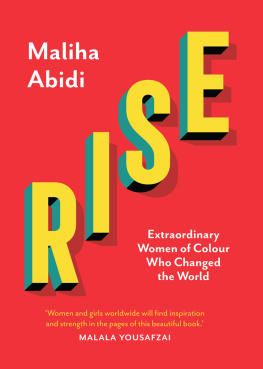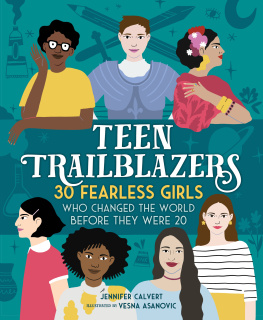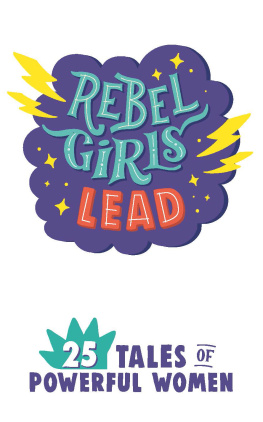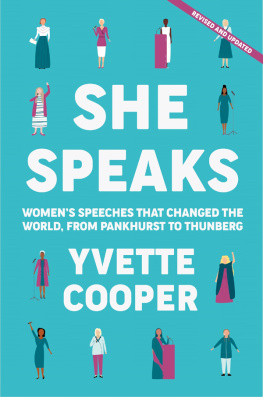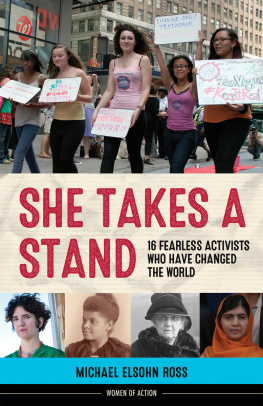Just like moons and like suns, With the certainty of tides, Just like hopes springing high, Still I'll rise.
From Still I Rise by Maya Angelou
To Papa and Aski
Contents
Rise introduces 100 extraordinary women of colour from around the globe, whose lives have spanned millennia, and more than thirty countries. These women are an inspiration to me, as I hope that they will be to you, too.
Growing up, I rarely came across positive stories of women who looked like me or who I could identify with, culturally or otherwise. I wanted to create Rise so that other women of colour could find themselves, and empowerment, in a book. I wanted to honour these incredible female scientists, activists, leaders and artists who have worked both behind the scenes and under public scrutiny to make the world a better place.
Women from all walks of life are included here. Despite challenges, they rose to dizzying heights in a wide range of fields. From Esther Afua Ocloo, the entrepreneur with a homemade marmalade business who went on to found Womens World Banking, and Yusra Mardini, the athlete who fled civil war on a sinking boat, then swam in the Olympics; to Mae C. Jemison, an astronaut chosen from thousands of other candidates; these women prove that we can reach for the stars.
While some of the women included in Rise Rosa Parks, Michelle Obama, Frida Kahlo, for example are household names around the world; many others are still not well known, sometimes not even in their own countries. Though these iconic womens contributions are vitally important, it can sometimes feel like the same few are celebrated over and over again. There seems to be little space for more women of colour in mainstream media, resulting in a mis- or under-representation of Black, Arab, Indigenous, Asian, Brown or Mixed women. This feeds into the erroneous narrative that there are only a handful of role models who are women of colour. I hope that Rise shows how these remarkable women are, and always have been, on the frontline of change and creativity.
Being a woman of colour will mean something different to each one of us. What we do have in common, however, is an experience of discrimination both because of our gender and on account of our race. This is why intersectional feminism, a term coined by Kimberl Crenshaw, was so close to my heart while creating Rise and why, although this book is predominantly a celebration, I chose not to diminish the hardships or traumas the women endured on their way to becoming incredible pioneers. To write only of their achievements would be doing a disservice to these women, and to my readers.
As I brought together these womens stories and portraits, I realised that there were many similarities between them. One pattern I noticed again and again was that they never gave up. This is true regardless of whether the woman was an athlete going for gold, a lawyer arguing for her client or one of the countless women fighting for recognition of their communities. And these trailblazing women not only stood up for themselves; they paved the way for so many others, too.

Eagle Hunter
Born May 2001
Mongolia

For over a thousand years, the nomads of the Altai Mountains in Central Asia have hunted with eagles for food and fur during the harsh winters. The role of the hunter among Mongolian tribes has generally been a male preserve, and this tradition is typically passed on from father to son. But Aisholpan Nurguiv, a Mongolian Kazakh girl, had been fascinated by eagles since early childhood. She aspired to study medicine, but not before becoming an eagle hunter like her father.
Men in the community objected on the basis of their conviction that women are constitutionally unsuited to eagle hunting. Although Nurguiv was not the first female eagle hunter, women in this role are rare. Nurguivs family, however, encouraged her. She and her father set out to acquire an eagle of her own. After scouting the mountains and finding a nest, Nurguiv descended the steep mountain face and captured an eaglet a very difficult task.
You were as brave as any man, her father told her.
Nurguiv began training to compete in the annual Golden Eagle Festival in lgii, Mongolia something no woman had ever done. Her father taught her how to summon her eagle, how to strengthen her bond with it and how to hunt with it.
On the day of the festival, more than seventy eagle hunters from several regions came to compete. Each was scored over several rounds. The first phase of the competition focused on equipment and horsemanship; the second, on summoning the eagle. In both rounds, Nurguiv scored highly. The third round judged the speed with which an eagle responds to the hunters command. Nurguiv set a record time of five seconds.
Thirteen-year-old Nurguiv placed first, winning against older men with more experience. Her story was captured in an acclaimed 2016 documentary and she became renowned in Mongolia and beyond. She has continued to hunt with her father and still aims to become a doctor.

Congresswoman
Born 13 October 1989
United States of America

Alexandria Ocasio-Cortez was born and raised in New York Citys Bronx borough. When she was five, her family moved to the suburb of Westchester, using all their funds plus borrowed money: her parents hoped to provide young Alexandria and her brother with better schooling and quality of life.
When Ocasio-Cortez was sixteen, her father was diagnosed with lung cancer. Times became difficult for the family, emotionally and financially, and they nearly lost their home. Ocasio-Cortezs mother cleaned houses, sometimes in exchange for university-preparation classes for her daughter.
Ocasio-Cortez gained admission to Boston University. Just before her sophomore year, during the financial crisis of 2008, her father died, and the familys situation worsened. They moved back to the Bronx, where Ocasio-Cortez joined them after graduating. She began working for an educational non-profit organisation, helping undocumented Latinx youths. She also worked as a bartender, taking extra shifts in order to support her family, recognising that their struggles were mirrored in the stories of many other local people.
In 2016, a political action committee called Brand New Congress approached Ocasio-Cortez to run for a seat in the US House of Representatives in 2018. (Her brother had nominated her; she was selected from 10,000 possible candidates.)
Women like me arent supposed to run for office, she said in her campaign video. Ocasio-Cortez was widely underestimated: her opponent in the primary election had run unopposed for fourteen years. Her campaign was entirely grassroots-funded. She spoke about the adversity her community faced, including financial hardship, lack of healthcare and housing issues. Having confronted such problems while growing up, she was persuasive; voters realised that she would fight for them in government.
Ocasio-Cortez became the youngest congresswoman in US history and has earned a reputation for vigorously holding politicians and business interests to account.

